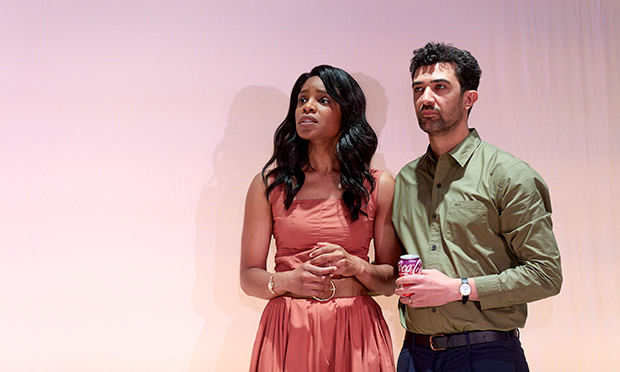How to Fight Loneliness: ‘Show, don’t tell’ – review, Park Theatre

How to Fight Loneliness. Photograph: Mark Douet
Neil Le Bute’s play How to Fight Loneliness is a conundrum of tell not show, and a tale of dark, unforeseen consequences.
We start with a seemingly happy couple at home, waiting for a guest to arrive.
There are snacks and a bar full of drinks. But when the guest does arrive, we are knitted into a long discussion over some of life’s deepest questions, in what feels like an endless slow overture.
Fear not, however, the characters do make decisions by the end of Act I, we see, as will the characters, they bear the impact of these across the next two acts.
Directed by Lisa Sperling, the cast play their parts well, particularly Jodie, a smooth, elegant wife, played with care and precision by Justina Kehinde.
Then there is Brad, her earnest, but almost lost husband (Archie Backhouse).
And added late to the mix is Tate (Morgan Watkins), the stranger who turns the story into a frightening reality, revving up the second and third acts.
The performance we attended also came with accessibility; we had a touch tour before the play (always good to feel the tables and shape of a stage, and hear the actors’ character voices) and during the show, live audio description (AD).
For those who don’t know, AD is a narrative spoken live and shared via radio into an earpiece that helps blind and visually impaired people know what is happening on stage.
Our audio describer was called “Cordelia” and her voice was smooth and silky as alpine mountain water. If we were to make one negative comment, it was that the AD was a bit jolting, and radio silence came and went without continuity.
We suspect this was not the lovely Cordelia’s fault. So often AD is considered a bolt on by directors, rather than something that has been integrated at rehearsals. None the less kudos to The Park Theatre for pushing this initiative at a local theatre.
Yet our problem came not so much with the acting or the audio description, but the play itself.
As with many of LaBute’s plays and films, (The Shape of Things, Possession, and The Company of Men comes to mind) the devil is in the detail.
The dilemmas he raises are pertinent and complex, and keep you engaged, but the dialogue, particularly in Act I, was laboured and mannered; sentences repeated back and forth to each other, to ensure we understood what was meaningful.
And throughout, so much time was spent with the characters telling us how they felt – we never actually experienced the pain and anguish.
Whilst the theatre’s promotional material says the play “takes an unflinching look at how we navigate our lives when time is running out” this is the key problem here: we did not flinch.
We listened and watched, but at the end we left not knowing if we believed or cared enough.
How to Fight Loneliness
Until 24 May
Park Theatre
Clifton Terrace
N4 3JP
—
